How to set up php development environment configuration
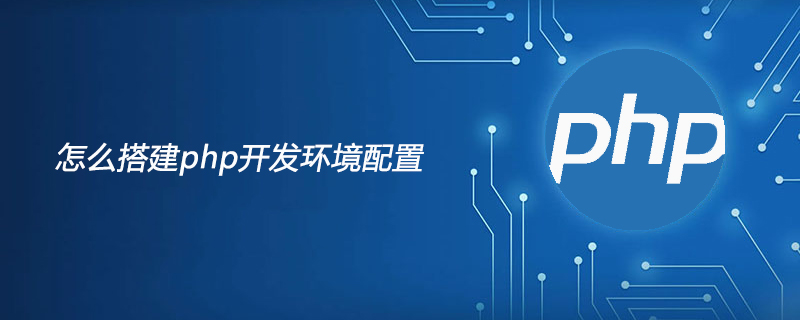
1. Preparation - Download the required software
●Apache httpd-2.4.25-win64-VC14.zip
● PHP php-7.1.0-Win32-VC14-x64.zip
Recommended: PHP Integrated Development Environment Tool (Integrated tool, one-click deployment, avoiding the tedious step-by-step setup)
2. Install the software (since the new version no longer provides installation files, only source code, VC14 installation method)
Solution to httpd: Could not reliably determine the server's fully qualified domain name
Install Apache: Double-click installation, which is no different from installing other Windows software. When filling in Server Infomation, there are no special regulations, just enter The information must conform to the format. (Related tutorial recommendations: php video tutorial)
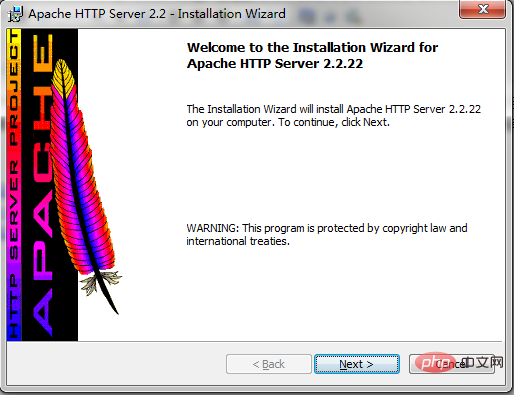
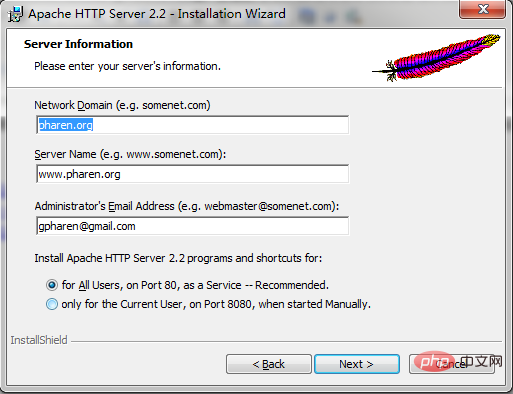
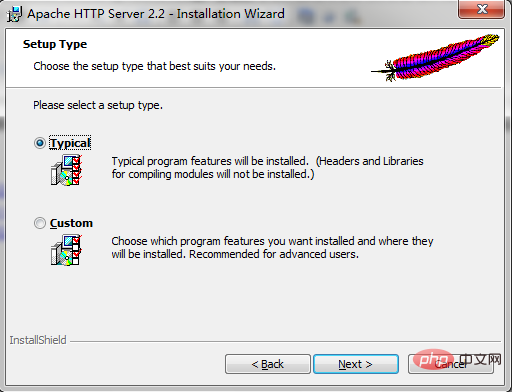
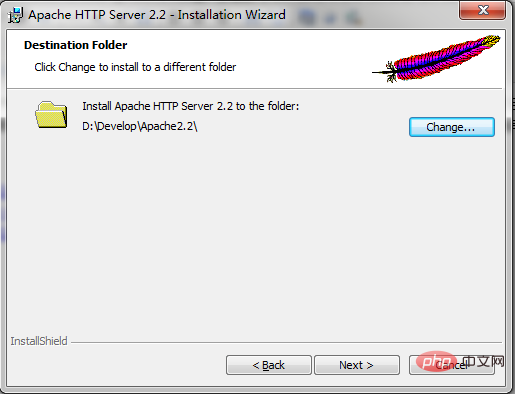
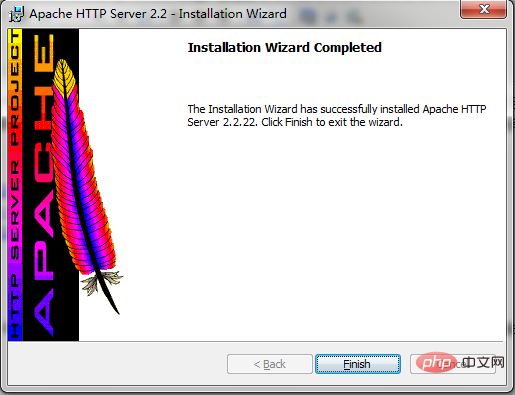 ## After the installation is complete, enter http://localhost in the browser. If It Works! is displayed, it means that Apache is installed successfully.
## After the installation is complete, enter http://localhost in the browser. If It Works! is displayed, it means that Apache is installed successfully.
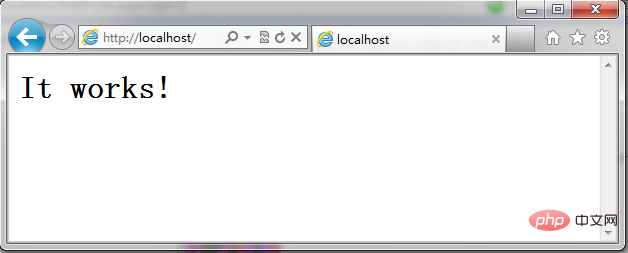
: Unzip php-5.3.10-Win32-VC9-x86.zip to a directory.
Install MySQL: Double-click to install. If you need to change the installation directory, select Custom
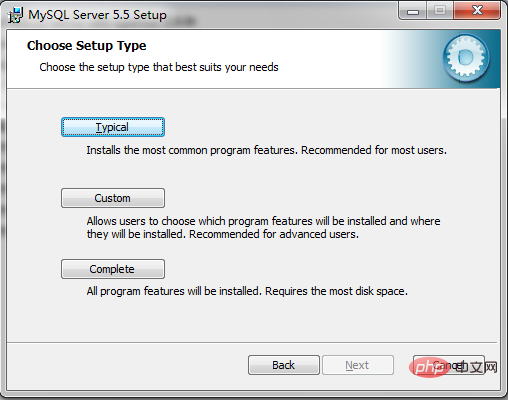
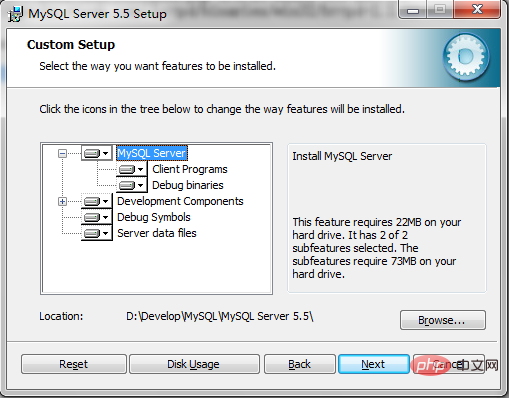 ## After the installation is complete, start configuring MySQL. You can keep all the default options, but it is best to change the MySQL default encoding to utf8, set the password in the Modify Security Settings option, and enter the password twice to complete. Finally, click Execute to complete the configuration.
## After the installation is complete, start configuring MySQL. You can keep all the default options, but it is best to change the MySQL default encoding to utf8, set the password in the Modify Security Settings option, and enter the password twice to complete. Finally, click Execute to complete the configuration. 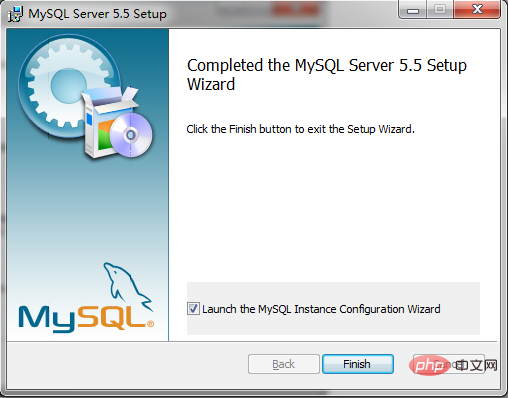
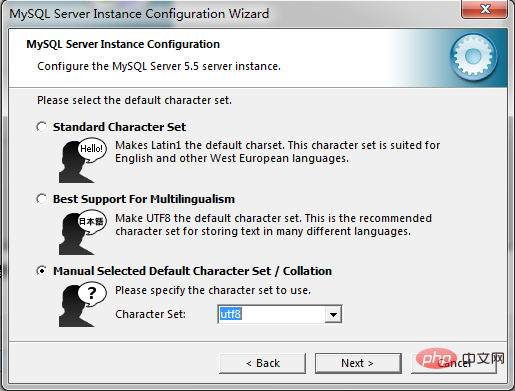
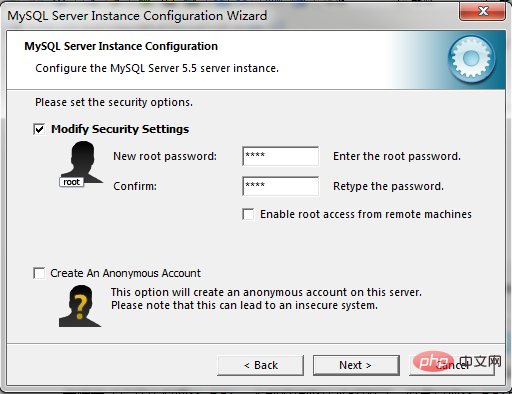 3. Integrate Apache PHP MySQL
3. Integrate Apache PHP MySQL
Apache: First modify the Apache configuration file , let Apache support parsing PHP files. The Apache configuration file is httpd.conf in the conf directory of the Apache installation directory.
1. Allow Apache to parse the php file and find in the configuration file. #LoadModule vhost_alias_module modules/mod_vhost_alias.so Add in the next line (the green position is based on PHP Depends on the directory where it is located) LoadModule php5_module "D:/Develop/PHP/php5apache2_2.dll
" PHPIniDir "D:/Develop/PHP "
AddType application/x-httpd-php .php .html .htm 2. Find
index.php
index.html3. Modify the Apache site directory and find it in the configuration file (the values displayed are different depending on the directory where Apache is installed)
DocumentRoot "D:/Develop/Apache2.2/htdocs
"Changed to
DocumentRoot "D:/Workspace/PHP
"Find again
Change to
PHP: Rename php.ini-development to php.ini as the PHP configuration file. Modify php.ini
1. Set the specific directory of the PHP extension package and find
; On windows:
; extension_dir = "ext"
Change to (value Is the directory of the ext folder)
; On windows:
extension_dir = "D:/Develop/PHP/ext"
2. Open the corresponding library Function, find the line of the library that needs to be opened
;extension=php_curl.dll
;extension=php_gd2.dll
;extension=php_mbstring.dll
;extension=php_mysql.dll
;extension=php_xmlrpc.dll
Remove the preceding semicolon (comment), that is, change it to
extension=php_curl.dll
extension=php_gd2.dll
extension=php_mbstring.dll
extension=php_mysql.dll
extension=php_xmlrpc.dll
3 . Set the time zone and find
; date.timezone =
Change to
date.timezone = Asia/Shanghai
The configuration is complete, check whether the configuration is complete success. Restart Apache, create a new file index.php in the site directory, enter the content:
<?php phpinfo(); ?>
Open the browser and enter http://localhost. If the following content is displayed, the installation is successful and the association is successful. MySQL.
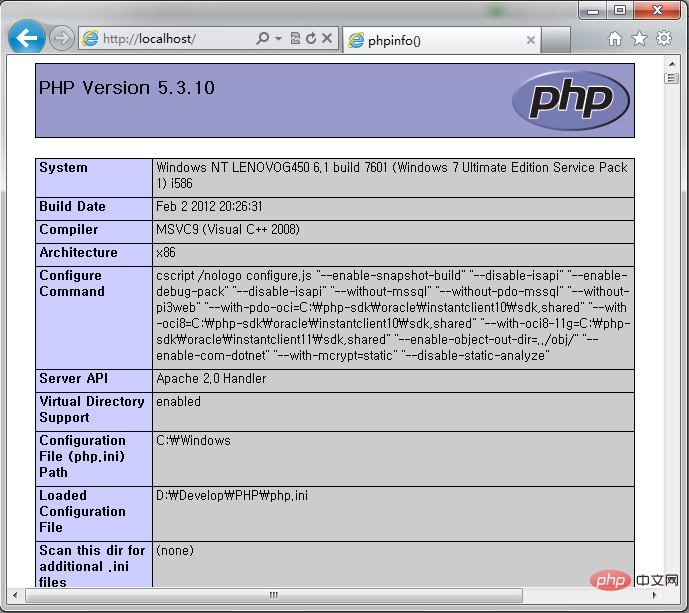
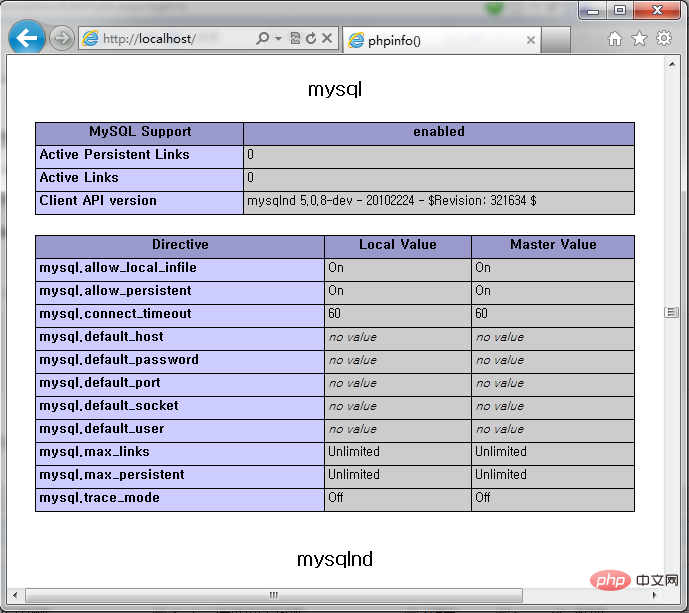
The above is the detailed content of How to set up php development environment configuration. For more information, please follow other related articles on the PHP Chinese website!

Hot AI Tools

Undresser.AI Undress
AI-powered app for creating realistic nude photos

AI Clothes Remover
Online AI tool for removing clothes from photos.

Undress AI Tool
Undress images for free

Clothoff.io
AI clothes remover

Video Face Swap
Swap faces in any video effortlessly with our completely free AI face swap tool!

Hot Article

Hot Tools

Notepad++7.3.1
Easy-to-use and free code editor

SublimeText3 Chinese version
Chinese version, very easy to use

Zend Studio 13.0.1
Powerful PHP integrated development environment

Dreamweaver CS6
Visual web development tools

SublimeText3 Mac version
God-level code editing software (SublimeText3)

Hot Topics
 1663
1663
 14
14
 1420
1420
 52
52
 1313
1313
 25
25
 1266
1266
 29
29
 1239
1239
 24
24
 How do you parse and process HTML/XML in PHP?
Feb 07, 2025 am 11:57 AM
How do you parse and process HTML/XML in PHP?
Feb 07, 2025 am 11:57 AM
This tutorial demonstrates how to efficiently process XML documents using PHP. XML (eXtensible Markup Language) is a versatile text-based markup language designed for both human readability and machine parsing. It's commonly used for data storage an
 Explain JSON Web Tokens (JWT) and their use case in PHP APIs.
Apr 05, 2025 am 12:04 AM
Explain JSON Web Tokens (JWT) and their use case in PHP APIs.
Apr 05, 2025 am 12:04 AM
JWT is an open standard based on JSON, used to securely transmit information between parties, mainly for identity authentication and information exchange. 1. JWT consists of three parts: Header, Payload and Signature. 2. The working principle of JWT includes three steps: generating JWT, verifying JWT and parsing Payload. 3. When using JWT for authentication in PHP, JWT can be generated and verified, and user role and permission information can be included in advanced usage. 4. Common errors include signature verification failure, token expiration, and payload oversized. Debugging skills include using debugging tools and logging. 5. Performance optimization and best practices include using appropriate signature algorithms, setting validity periods reasonably,
 Explain late static binding in PHP (static::).
Apr 03, 2025 am 12:04 AM
Explain late static binding in PHP (static::).
Apr 03, 2025 am 12:04 AM
Static binding (static::) implements late static binding (LSB) in PHP, allowing calling classes to be referenced in static contexts rather than defining classes. 1) The parsing process is performed at runtime, 2) Look up the call class in the inheritance relationship, 3) It may bring performance overhead.
 PHP Program to Count Vowels in a String
Feb 07, 2025 pm 12:12 PM
PHP Program to Count Vowels in a String
Feb 07, 2025 pm 12:12 PM
A string is a sequence of characters, including letters, numbers, and symbols. This tutorial will learn how to calculate the number of vowels in a given string in PHP using different methods. The vowels in English are a, e, i, o, u, and they can be uppercase or lowercase. What is a vowel? Vowels are alphabetic characters that represent a specific pronunciation. There are five vowels in English, including uppercase and lowercase: a, e, i, o, u Example 1 Input: String = "Tutorialspoint" Output: 6 explain The vowels in the string "Tutorialspoint" are u, o, i, a, o, i. There are 6 yuan in total
 What are PHP magic methods (__construct, __destruct, __call, __get, __set, etc.) and provide use cases?
Apr 03, 2025 am 12:03 AM
What are PHP magic methods (__construct, __destruct, __call, __get, __set, etc.) and provide use cases?
Apr 03, 2025 am 12:03 AM
What are the magic methods of PHP? PHP's magic methods include: 1.\_\_construct, used to initialize objects; 2.\_\_destruct, used to clean up resources; 3.\_\_call, handle non-existent method calls; 4.\_\_get, implement dynamic attribute access; 5.\_\_set, implement dynamic attribute settings. These methods are automatically called in certain situations, improving code flexibility and efficiency.
 PHP and Python: Comparing Two Popular Programming Languages
Apr 14, 2025 am 12:13 AM
PHP and Python: Comparing Two Popular Programming Languages
Apr 14, 2025 am 12:13 AM
PHP and Python each have their own advantages, and choose according to project requirements. 1.PHP is suitable for web development, especially for rapid development and maintenance of websites. 2. Python is suitable for data science, machine learning and artificial intelligence, with concise syntax and suitable for beginners.
 PHP in Action: Real-World Examples and Applications
Apr 14, 2025 am 12:19 AM
PHP in Action: Real-World Examples and Applications
Apr 14, 2025 am 12:19 AM
PHP is widely used in e-commerce, content management systems and API development. 1) E-commerce: used for shopping cart function and payment processing. 2) Content management system: used for dynamic content generation and user management. 3) API development: used for RESTful API development and API security. Through performance optimization and best practices, the efficiency and maintainability of PHP applications are improved.
 PHP: A Key Language for Web Development
Apr 13, 2025 am 12:08 AM
PHP: A Key Language for Web Development
Apr 13, 2025 am 12:08 AM
PHP is a scripting language widely used on the server side, especially suitable for web development. 1.PHP can embed HTML, process HTTP requests and responses, and supports a variety of databases. 2.PHP is used to generate dynamic web content, process form data, access databases, etc., with strong community support and open source resources. 3. PHP is an interpreted language, and the execution process includes lexical analysis, grammatical analysis, compilation and execution. 4.PHP can be combined with MySQL for advanced applications such as user registration systems. 5. When debugging PHP, you can use functions such as error_reporting() and var_dump(). 6. Optimize PHP code to use caching mechanisms, optimize database queries and use built-in functions. 7




